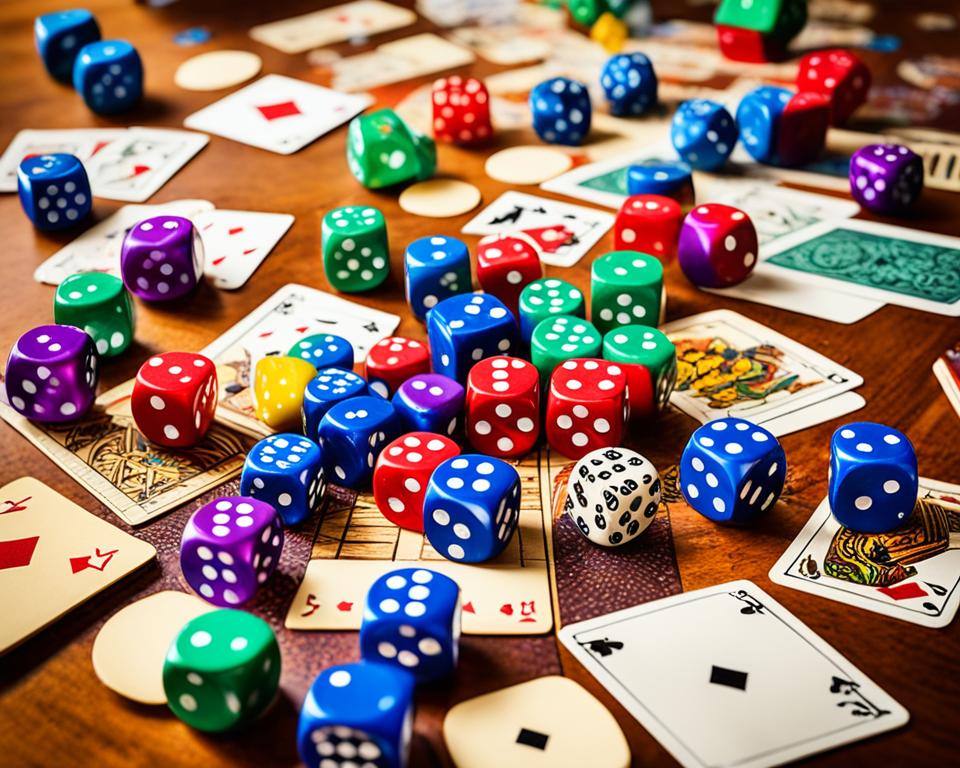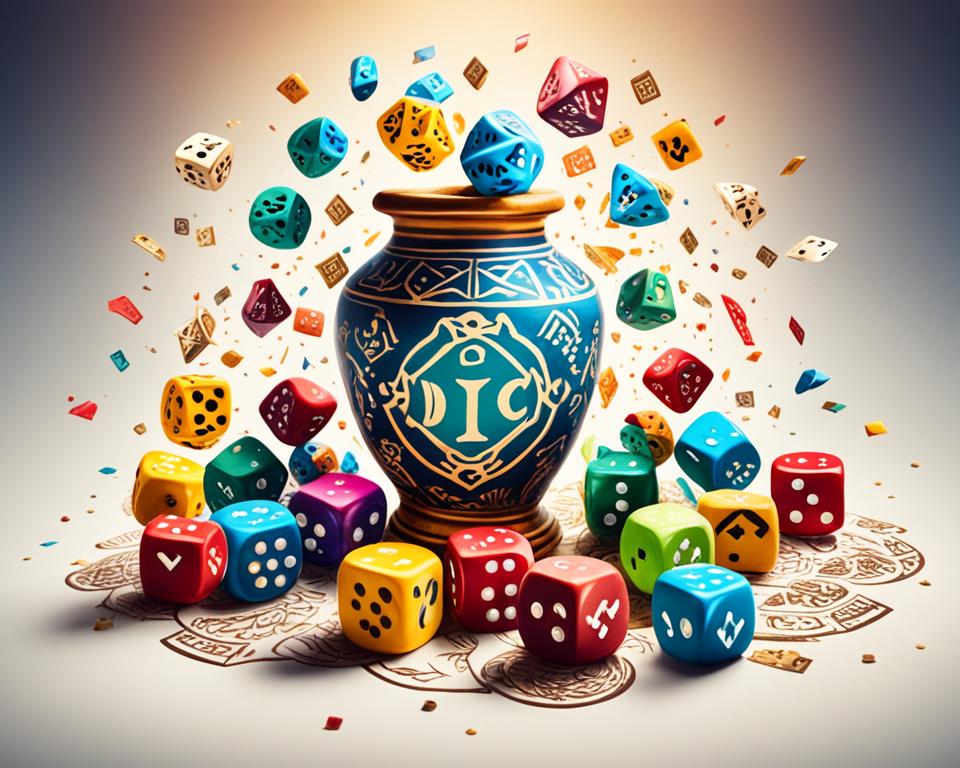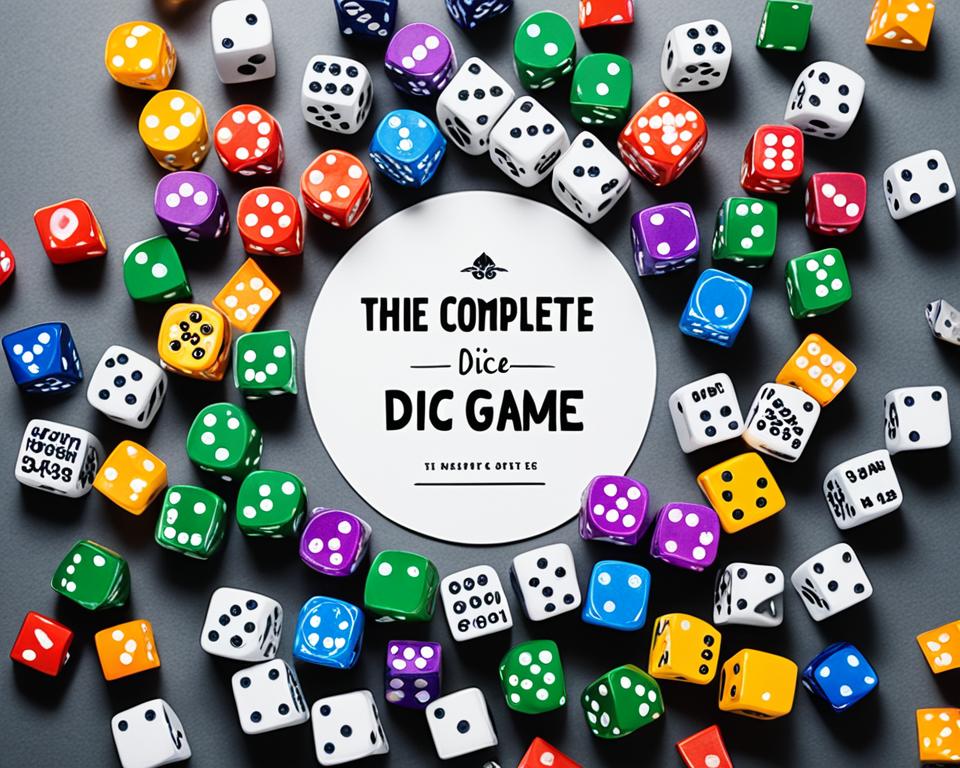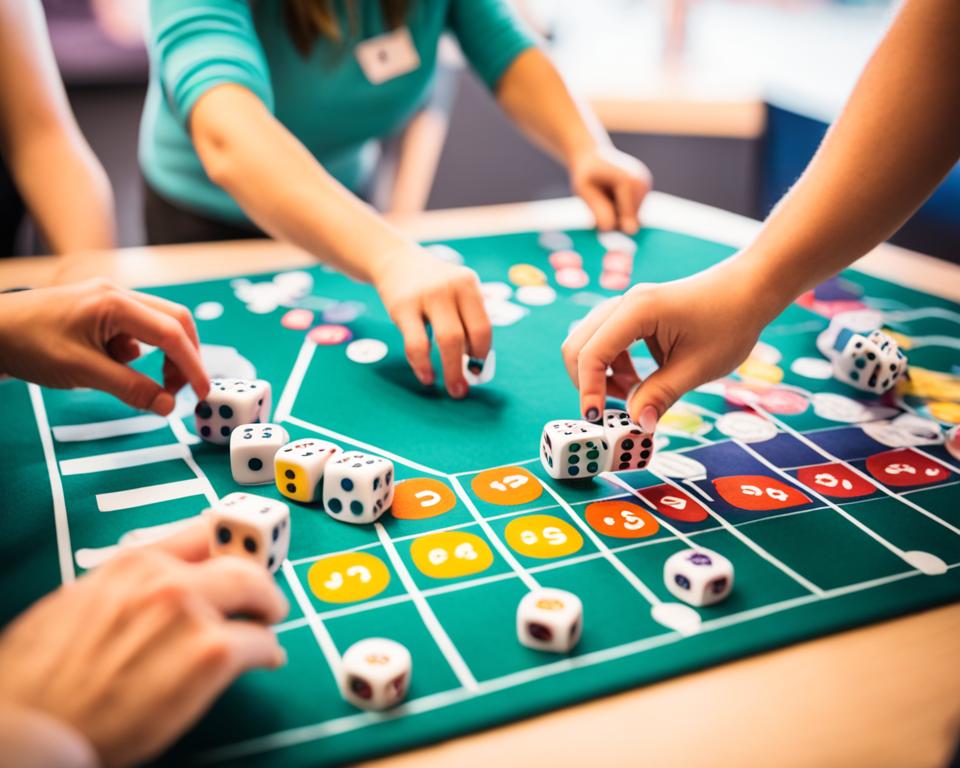Dice games have a long and fascinating history, dating back thousands of years. These games of chance and skill have captured the imaginations of people worldwide, offering a diverse range of gameplay experiences. From classic tabletop games to innovative modern variations, the world of dice games is vast and ever-evolving. This comprehensive article will explore the myriad of dice games, delving into their origins, game mechanics, and social impact. By the end, readers will have a deeper understanding of the sheer variety and allure of these games of probability and strategy.
Introduction to the Fascinating World of Dice Games
The captivating realm of dice games stretches back thousands of years, with a rich tapestry of history woven throughout diverse civilizations. From the ancient Egyptians to the renowned Chinese Han Dynasty, dice have long been a central component in various forms of gambling, divination, and social games. These early dice games laid the foundation for the vast array of dice-based entertainment we enjoy today, captivating players with their unique game mechanics and probability-driven gameplay.
The Ancient Origins of Dice Games
The origins of dice games can be traced back to the dawn of human civilization, with evidence of their use found in the archaeological records of ancient cultures. Researchers have uncovered dice made from various materials, including carved bones, ivory, and even terracotta, dating back thousands of years. These early dice were often used in gambling rituals, fortune-telling practices, and social games that brought people together, laying the groundwork for the diverse game variety we cherish today.
Dice Games: A Global Phenomenon
The allure of dice games has transcended geographical and cultural boundaries, making them a truly global phenomenon. From the bustling board games and tabletop games of ancient civilizations to the thrilling gambling games found in modern-day casinos, the game mechanics and probability inherent in dice games have captivated players worldwide. This universal appeal has led to the emergence of countless classic games and innovative modern variations, ensuring that the dice game tradition continues to evolve and captivate new generations of enthusiasts.
Exploring the Many Genres of Dice Games
The world of dice games is remarkably diverse, encompassing a wide range of genres and gameplay styles. From classic tabletop games that have captivated players for generations to innovative modern variations that push the boundaries of dice-based entertainment, the dice game genre offers an abundance of options for enthusiasts of all ages and skill levels.
Classic Dice Games Played Across Generations
Many dice games have stood the test of time, becoming beloved classics that are played across generations. Iconic tabletop games like Yahtzee, Farkle, and Craps have enthralled players with their simple yet engaging game mechanics and focus on probability and strategic decision-making. These timeless board games and gambling games continue to captivate new audiences, offering a social and interactive gaming experience that transcends the boundaries of time.
Innovative Modern Dice Games
Alongside the enduring popularity of classic dice games, the industry has witnessed a surge of innovative modern variations that push the boundaries of what is possible with these game of chance. Contemporary tabletop games and board games have introduced novel game mechanics, complex probability calculations, and unique game rules that cater to the evolving preferences of game enthusiasts. These modern dice games often incorporate elements of resource management, push your luck mechanics, and even cooperative gameplay, ensuring a diverse array of game variety for players to explore and enjoy.
Probability and Dice Games: Understanding the Odds
At the heart of dice games lies the fundamental concept of probability, as the rolling of dice determines the outcome of the game. Understanding the probability mechanics behind these games is crucial for players to make informed decisions and develop effective strategies. From the basic probabilities of rolling a single die to the complex calculations involved in multi-dice games, the world of dice game probability offers a fascinating intersection of mathematics and gameplay.
The simplest probability calculation in a dice game is the likelihood of rolling a specific number on a single die. With six possible outcomes (1, 2, 3, 4, 5, and 6), each face has an equal probability of 1/6 or approximately 16.67%. As the number of dice increases in a game, the probability calculations become more intricate, involving combinations and permutations to determine the likelihood of various outcomes.
For instance, in the classic dice game of Craps, players wager on the combined result of two dice. Understanding the probability of rolling specific totals, such as 7 or 11, is essential for making informed bets and developing effective game strategies. Similarly, in Yahtzee, players must consider the probability of achieving specific dice combinations to maximize their scoring potential.
Beyond the basic probabilities, dice games often incorporate more complex probability mechanics, such as the concept of “expected value.” This mathematical calculation helps players assess the long-term viability of their game strategies by weighing the potential rewards against the likelihood of success. Understanding these advanced probability principles can give players a significant edge in navigating the game variety of dice-based entertainment.
Ultimately, the study of probability in dice games offers a rich and fascinating field of exploration, blending mathematics, game mechanics, and the thrill of chance. By delving into the probability-based nuances of these classic games, players can enhance their understanding, improve their decision-making, and ultimately, elevate their experience in the captivating world of dice games.
Dice Games: A Versatile Tool for Gambling
Dice games have long been associated with the world of gambling, captivating both seasoned enthusiasts and newcomers alike. From the high-stakes casino floors to the casual street games played by enthusiasts, these games of chance and probability have become an integral part of the gambling landscape.
Dice Games in Casinos
In the realm of casino gaming, dice-based games like Craps and Sic Bo have become iconic, offering players the thrill of chance and the opportunity for substantial winnings. These games attract a diverse crowd, from experienced gamblers seeking the rush of high-stakes gameplay to novice players drawn in by the dynamic nature of the dice-rolling action. The allure of these casino dice games lies in their ability to generate a sense of excitement and anticipation, as players eagerly await the outcome of each roll.
Street Dice Games: A Gambler’s Playground
Alongside the glitz and glamour of casino dice games, a vibrant culture of street dice games has also thrived, catering to a more casual and grassroots gambling community. These informal gatherings, often taking place in public spaces or private settings, provide a platform for enthusiasts to engage in dice games, wagering on the unpredictable outcomes of the rolling cubes. From the classic game of Craps to more localized variants, these street dice games offer a sense of camaraderie and excitement, fostering a unique social dynamic among the participants.
The Social Aspect of Dice Games
Dice games have long been valued for their ability to bring people together and foster social interaction. These games of chance and strategy often serve as icebreakers, allowing strangers to connect over a shared experience of probability, game mechanics, and friendly competition.
Dice Games as Icebreakers and Party Games
The communal nature of dice games encourages players to engage in friendly banter, friendly competition, and the creation of shared memories. Whether it’s a lively game of Craps at a casino, a spirited round of Yahtzee at a family gathering, or an impromptu street dice game among a group of enthusiasts, these tabletop games have the power to break the ice and foster camaraderie.
The element of probability and the unpredictable nature of dice rolls create a sense of shared excitement and anticipation, encouraging players to interact, celebrate successes, and commiserate over setbacks. This communal experience can be particularly valuable in party game settings, where dice games serve as engaging icebreakers and social catalysts.
Educational Benefits of Dice Games
Dice games, with their inherent focus on probability, number skills, and strategic decision-making, have long been recognized for their educational benefits. These dice games can be powerful tools for teaching and reinforcing mathematical concepts, as players engage with probabilities, number skills, and logical reasoning.
Teaching Math Skills Through Dice Games
When it comes to game mechanics and game rules, dice games offer a captivating way to introduce and reinforce essential mathematical principles. From basic counting and arithmetic to more advanced statistical analysis, these classic games provide a hands-on learning experience that can make math engaging and accessible for players of all ages.
Developing Strategic Thinking with Dice Games
Beyond their mathematical applications, dice games also offer valuable opportunities to cultivate strategic thinking skills. As players navigate the probability and game variety inherent in these tabletop games, they must make decisions that balance risk, resource management, and long-term planning. This dynamic interplay between chance and strategy can sharpen critical thinking abilities and foster a deeper understanding of gambling games and board games.

Dice Games for All Ages
The captivating world of dice games is characterized by its remarkable adaptability, catering to players of all ages and skill levels. From engaging children’s dice games to more complex and challenging offerings for adults, the diverse landscape of dice-based entertainment provides something for everyone to enjoy.
Engaging Dice Games for Children
Dice games have long been recognized as an excellent way to introduce young minds to the principles of probability, strategy, and social interaction. Games like Pig, Farkle, and Shut the Box offer an engaging and educational experience, allowing children to hone their math skills, decision-making abilities, and cooperative play. These games often feature simple rules, colorful components, and an element of chance that captivates young players, fostering a love for the excitement of dice games.
Challenging Dice Games for Adults
While children’s dice games provide a fun and accessible entry point, the world of dice games also offers a wealth of more complex and strategic offerings for adult players. Classic games like Craps, Yahtzee, and Sic Bo challenge players to navigate intricate probability calculations, manage resources, and make high-stakes decisions. These games often involve deeper levels of strategy, probability, and risk-taking, appealing to the more experienced and discerning dice enthusiast. By engaging with these more sophisticated dice games, adults can enjoy the thrill of gameplay while exercising their analytical and problem-solving skills.
How Many Dice Games Are There?
The answer to the question “How many dice games are there?” is not a simple one, as the world of dice games is vast and ever-expanding. Dice games have been a part of human civilization for millennia, with countless variations and interpretations emerging across cultures and time periods.
Exploring the Vast Variety of Dice Games
From the ancient Egyptians and Chinese Han Dynasty to the modern-day enthusiasts, dice games have captivated people around the globe with their unique blend of probability, strategy, and social interaction. The sheer variety of dice games available is truly astounding, encompassing classic tabletop favorites like Yahtzee and Farkle, as well as innovative modern dice games that push the boundaries of game mechanics and probability.
The Ever-Evolving World of Dice Games
The world of dice games continues to evolve, with new and exciting variations constantly emerging to capture the imagination of players. From the thrilling gambling games played in casinos to the lighthearted board games and tabletop games enjoyed by families and friends, the game rules and game variety of dice-based entertainment are endlessly diverse and captivating.
The Evolution of Dice Games: From Antiquity to Modern Times
The rich history of dice games is a testament to their enduring appeal and adaptability. From their ancient origins in civilizations across the globe to their modern-day iterations, these games of chance and strategy have evolved and transformed, reflecting the ever-changing cultural, technological, and social landscapes.
The earliest known dice games date back thousands of years, with evidence of their use in ancient Egypt, China, and other ancient societies. These classic games often served as gambling games, divinatory tools, and social pastimes, laying the foundation for the diverse array of dice-based entertainment we enjoy today.
As the centuries passed, dice games continued to evolve, adapting to the needs and preferences of new generations. The advent of modern board games and tabletop games in the 20th century saw the integration of dice mechanics into a wide range of gaming experiences, from family-friendly game nights to more complex strategic challenges.
In recent decades, the digital revolution has further impacted the world of dice games, with the development of innovative mobile applications and online platforms that bring the thrill of probability-based gameplay to the fingertips of players worldwide. These digital adaptations have not only preserved the essence of classic dice games but have also spawned new game variations that capitalize on the unique game mechanics and probability algorithms inherent to these timeless games of chance.

As we look to the future, the evolution of dice games continues unabated, with game designers and enthusiasts alike exploring new ways to push the boundaries of this captivating genre. From the development of innovative game mechanics to the integration of emerging technologies, the world of dice games remains a dynamic and ever-evolving playground for those seeking the thrill of probability-driven entertainment.
Dice Games in Pop Culture and Media
The enduring popularity of dice games has extended far beyond the confines of gaming circles, permeating various realms of pop culture and media. From the silver screen to the pages of literature, these games of chance and strategy have captivated audiences worldwide, cementing their status as iconic symbols of entertainment and human experience.
Dice Games in Movies and TV Shows
The allure of dice games has long been a source of fascination for filmmakers and television producers. In the realm of cinema, dice-centric scenes have become a staple, often used to heighten the drama, tension, and suspense of a given narrative. Classic films like Casino, Ocean’s Eleven, and The Sting have all featured dice games prominently, leveraging their ability to convey the thrill of risk-taking and the pursuit of high-stakes rewards.
Similarly, in the world of television, dice games have become a recurring motif, appearing in a diverse array of shows. From the high-stakes poker games of Suits to the mythological dice rituals of Game of Thrones, these games have the power to captivate audiences and drive the plot forward, offering a glimpse into the characters’ decision-making processes and the consequences of their choices.
Dice Games in Literature and Art
The influence of dice games extends beyond the screen, permeating the realm of literature and artistic expression. In the written word, authors have long used dice as a symbolic device, weaving their mechanics and probabilities into the fabric of their narratives. From the philosophical musings of The Unbearable Lightness of Being to the fantastical dice-based magic systems of Dungeons & Dragons novels, these games have proven to be a rich source of inspiration for storytellers.
In the visual arts, dice have also found a prominent place, serving as both subject and medium. Renowned artists have incorporated dice and their symbolic meanings into their works, exploring themes of chance, fate, and the human condition. From the surrealist collages of Max Ernst to the kinetic sculptures of Yayoi Kusama, dice have become a powerful visual metaphor, captivating audiences and inviting deeper contemplation.
Dice Games and Their Unique Game Mechanics
Dice games are distinguished by their unique game mechanics, which often revolve around the element of chance and the strategic decisions that arise from the roll of the dice. Two particularly notable game mechanics found in the world of dice games are the “push your luck” mechanic and the integration of strategic resource management.
Push Your Luck Mechanics in Dice Games
The “push your luck” mechanic is a captivating feature of many dice games, where players must weigh the potential rewards against the risks of continuing to roll the dice. Games like Yahtzee and Farkle exemplify this mechanic, challenging players to decide whether to keep rolling the dice in pursuit of a better outcome or to settle for a safer score. This delicate balance between risk and reward creates a thrilling gameplay experience, as players must navigate the probabilities and make strategic decisions that could lead to either great success or devastating failure.
Dice Games with Strategic Resource Management
In addition to the “push your luck” mechanic, some dice games incorporate strategic resource management as a key element of their gameplay. These games often require players to carefully allocate and manage limited resources, such as dice, in order to achieve their objectives. Games like Catan and Castles of Burgundy demonstrate this principle, where players must strategically deploy their dice to acquire resources, develop their game boards, and outmaneuver their opponents. This integration of probability, resource management, and tactical decision-making creates a compelling and intellectually engaging experience for players of all skill levels.
The unique game mechanics found in dice games contribute to their enduring popularity and appeal, offering players a diverse range of gameplay experiences that blend chance, strategy, and social interaction. Whether it’s the thrill of the “push your luck” mechanic or the challenge of strategic resource management, the world of dice games continues to captivate and enthrall players worldwide.


